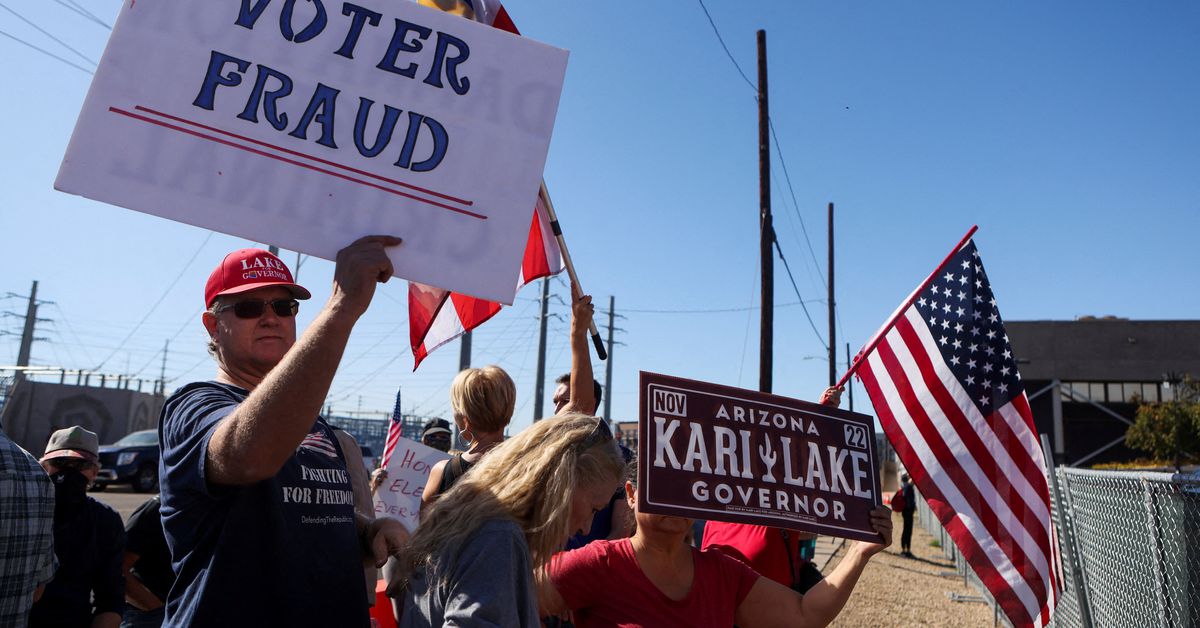In Arizona, election deniers refuse to back down

Nov 28 – As Arizona counties face a Monday deadline to certify their midterm election results, Republican candidates and activists promoting false theories of voter fraud are refusing to back down.
State Senator-elect Jake Hoffman, head of Arizona’s Freedom Caucus, a group of largely pro-Trump Republican state lawmakers, told Reuters he will lead an investigation into the state’s election when the legislature reconvenes in January.
Right-wing activist Steve Bannon, a former Trump administration official and promoter of election conspiracy theories, said voting machine mishaps on the Nov. 8 Election Day tainted Democrat Katie Hobbs’ victory over Kari Lake, the Republican candidate for governor who has refused to concede.
Hobbs “will never be considered legitimate,” said Bannon, who has been providing Lake counsel. “That’s going to cripple her ability to govern. So that’s why this is a crisis. There’s a crisis for the entire state.”
Lake, a vocal supporter of former President Donald Trump, was one of dozens of Republican candidates who questioned or denied the outcome of the 2020 presidential election and lost in the midterms.
The defeat of Lake and other election deniers was seen as a powerful rebuke of candidates who echoed Trump’s myths of a stolen election.
Lake, however, has remained defiant after her 17,116-vote loss.
“We know we WON this election and we are going to do everything in our power to make sure that every single Arizonan’s vote that was disenfranchised is counted,” Lake said in an interview posted on her Twitter account on Saturday.
Lake’s team filed a lawsuit in state court on Wednesday against Maricopa County, demanding information on voters whose ballots were affected by voting machine problems. Her Republican colleague, Abe Hamadeh, who ran for attorney general and lost by 510 votes, has filed a lawsuit against his Democratic opponent as well as state and local officials, seeking to overturn his defeat.
In Maricopa County, tabulators at 71 of 223 polling stations were unable to read ballots because of printer ink problems on Election Day.
County officials said the issue was quickly addressed. Affected voters could deposit ballots in a secure on-site container called “box three” or wait for another ballot or travel to another polling center.
Republican activists urged voters not to use the secure box on Election Day, according to Maricopa County officials. Some activists expressed concerns on social media that ballots placed in secure boxes would not be counted.
“It certainly was not helpful as far as we were concerned because it was contradicting the official elections department information that we were trying to get out to voters in real time,” said Maricopa County spokesman Jason Berry.
Rejecting the secure boxes backfired, said David Becker, executive director of the nonpartisan Center for Election Innovation and Research. “If they followed instructions, there would’ve been no lines. There would’ve been no delays. They would’ve moved through the process very, very effectively.”
Becker, who consults Republican and Democrat election officials around the country, said Maricopa’s technical problems were not unusual and occur in every election at hundreds of polling centers nationally.
Maricopa officials have said that an estimated 17,000 voters were impacted by the problem with the printer ink.
Maricopa County on Sunday released a report detailing voter numbers by location on Election Day and was scheduled to certify election results on Monday.
DELAYS IN CERTIFICATION
Elsewhere in Arizona, two conservative counties, Mohave and Cochise, do not plan to certify election results until Monday, the final day to formally do so, following pressure by election deniers.
The chairman of Mohave County’s Board of Supervisors, Ron Gould, told Reuters that his county delayed certifying last Monday because his board was waiting to see Maricopa’s explanations for what happened to the ballots of its affected voters.
In Cochise County, the three-person board postponed its certification after hearing testimony on Nov. 18 from three election conspiracy theorists who argued that the county’s voting machines were not properly certified.
The Secretary of State’s office said the matter was due to a clerical error and sent a letter to the board last Tuesday that included documentation of the machines’ licenses.
But in an email to Reuters, Cochise County Supervisor Tom Crosby declined to say whether the board will certify the county’s results on Monday.
Editing by Jason Szep and Linda So
Our Standards: The Thomson Reuters Trust Principles.
